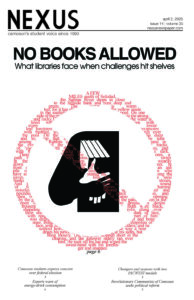The upcoming Canadian federal election will be met with apprehension and concern by some Camosun College students on April 28. For many of those in post-secondary, working toward a career and future, and often fairly young, tensions are high during this election; they’re concerned about what’s at stake and for how long results will last.
Having only sworn in as Canada’s 24th prime minister on March 14, succeeding Justin Trudeau’s negatively received leadership in his last term, Mark Carney has allowed students supportive of the Liberal Party of Canada to feel relief from the potential of a Conservative majority under party leader Pierre Poilievre. However, current polls project a tight race, still fuelling worry among many, including Camosun students.

First-year Arts and Science student Igo Campbell says they’re uncertain about what Canada’s coming years may bring after the election; their perspective on the future has changed in recent months, compelling them to reflect on new and more potent ways to weather.
“Whatever the impacts of [the Canada-US trade war], it’s going to be negative, and it’s going to be decades of impact. And so I’m trying to move away from being like, ‘Once I get a career, things are going to be stable,’ because I don’t even know what careers are going to look like in 10 years,” says Campbell. “ I think one of the major impacts that it’s had is I’m planning for the future less… and I’m much more, like, I’m just going to incrementally build what is around me as much as I possibly can. I’m trying to broaden my horizons as much as I can… instead of locking myself into a single path.”
Third-year Arts and Science student Charlie Crossno, who leans politically left, says she has experienced unease during this period, concerned over the long-term effects that may reverberate if Poilievre’s Conservative party holds office.
“I’m definitely worried about the outcome because it’s such a close race,” she says. “And I feel like anything that does happen will shape our future permanently because we’re in this very pivotal [period]. Are we going to have a revolution? Are we going to get rid of health care? There’s so much in the air, and it’s just going to make very permanent changes.”
Both Liberal and Conservative leaders have made promises to cease “wasteful spending.” However, as suggested by first-year Arts and Science student Katie de Varies, budget cuts and caps to Canada’s public service may result in job instability.
“As someone who is currently immigrating here and will probably have a family here one day, it’s really scary. I’m going into teaching elementary school, and I feel like funding within education and for health and stuff is really important to me,” she says. “And it scares me to think about immigrating to a country that I thought Canada was [and for it] to be possibly changing.”
First-year University Transfer student Danyn Fine argues that the motivation for budget cuts and cuts to taxation on behalf of prime minister Carney are politically performative. He believes the cuts will disproportionately target individuals with low income.
“I think, inevitably, no matter who gets elected, there’s going to be cuts. I think Carney is going to make cuts,” says Fine. “He’s already [gotten] rid of the carbon tax, which seems like a clearly political move and has very little to do with the tax itself, but more to do with the messaging around it. But it really does worry me because it’s going to make, unfortunately, life harder for people who already are struggling and already are having to rely on things that are designed to protect our most vulnerable.”
It’s important for Campbell to aim their focus toward more tangible means of community improvement and assistance. They plan to continue on their path toward support on the ground level.
“I want to get involved in the politics of local community, not necessarily in the officially political realm, but in that area. And It feels like even more of a call to do that,” says Campbell. “I think community support systems are really important.”
